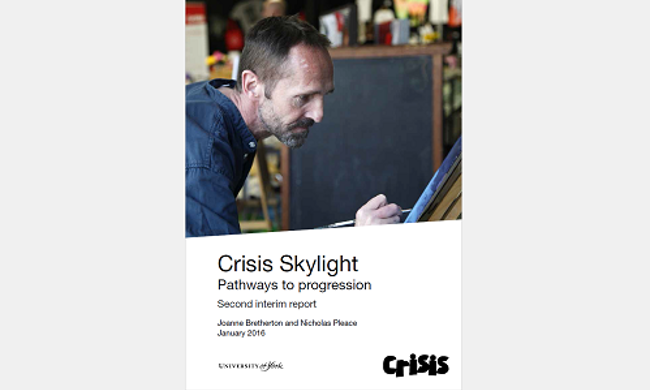Crisis Skylight Pathways to progression (2016)
30.01.2016
Crisis Skylight is a service for single homeless people that focuses on promoting health and well-being, housing stability, social support and employment. One-to-one support in Skylight focuses on a process of progression, designed to positively transform the social and economic position of single homeless people. Skylight also offers arts-based activities, basic skills education, training, volunteering, support with health and well-being, support in seeking work and assistance in finding and sustaining housing.
Key findings
- This report is the second interim report of a three-year, mixed-method, evaluation of the Skylight programme by the University of York. The evaluation covers three building-based Skylight services in London, Newcastle and Oxford and three outreach-based services in Birmingham, Edinburgh and Merseyside.
- Self-reported support needs among the cohort were high. When interviewed, 53% of cohort members reported a history of mental health problems and 31% a history of drug and alcohol problems. 37% reported a limiting illness or disability.
- Work experience was limited among the cohort members and they often had low levels of educational attainment. When interviewed, all reported they were unemployed at first contact with Skylight and 41% said that their formal education had been incomplete.
- Skylight seeks to deliver progression to a transformed life in which health, well-being, social supports and housing situation are improved and someone is either in paid work, or actively moving towards paid work. Among the cohort members, three sets of pathways to progression were identified, which can be described as regaining progress, moving forward for the first time and punctuated progression. Case studies are presented in chapter three of this report.
- Skylight members in the cohort who had regained progress were people who had lost work, or experienced disruption to further or higher education, as a result of homelessness. In these cases, Skylight had enabled people to resume their former path, returning them to paid work and or to further or higher education.
- The Skylight members in the cohort who were moving forward for the first time had made only limited progress in relation to education, training or securing paid work prior to their contact with Skylight. For this group of cohort members, Skylight had brought them into education, training, volunteering and paid work for the first time, in some cases after sustained or recurrent experiences of single homelessness.
- The final pathway to progression found among the cohort members was punctuated progress. These members reported in their interviews that they had made progress and in some cases had reached the point of getting paid work, entering volunteering, or further and higher education. However, a problem had arisen, such as work only being short-term or the recurrence of an issue such as a mental health problem, which had meant that their progress had been stalled or partially reversed. This group had returned to Skylight seeking help to resume their former progress.
Reference
Bretherton, J. & Pleace, N. (2016) Crisis Skylight Pathways to progression: Second interim report. London: Crisis.

